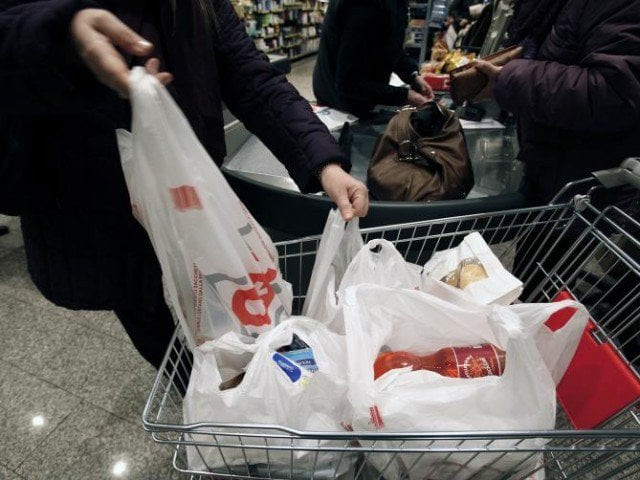Businessmen asked to introduce plastic bag substitutes
State minister stresses Punjab ready to ban use of plastic bags

Representational image. PHOTO: REUTERS
Addressing the business community at the Faisalabad Chamber of Commerce and Industry (FCCI), she said use of plastic bags would be banned in the near future and efforts were already afoot for systematic and planned tree plantations to overcome environmental pollution.
“Pakistan is ranked the seventh most vulnerable country facing the threat from global warming,” she said. “I have talked to Punjab Chief Minister Usman Buzdar and he is ready to ban the use of plastic bags throughout the province,” she said and urged the industrialists to introduce new technology for replacing the plastic bags.
“In this connection, my ministry is ready to provide maximum guidance and incentives,” she remarked.
The state minister pointed out that smog threat was around the corner and asked the government and industrialists to work closely to tackle the problem which emerged in every winter in recent years. “There are 30,000 industrial electricity connections in Pakistan but only 44 units have arrangements to treat their waste water,” she said while expressing concern.
Speaking on the occasion, the Ministry of Climate Change Environment Wing director general said the well-planned M3 industrial city was being established over 4,500 acres of land while a no-objection certificate for the Allama Iqbal Industrial Estate was under process.
The Allama Iqbal Industrial Estate will be established over an area of 3,300 acres. He pointed out that Faisalabad was the only city where a wastewater treatment plant had been functioning for the last many years at Chakera.
He claimed that sizing units, using cheap waste as fuel, were the main cause of smog in Faisalabad. However, now 70% of the units have installed wet scrappers to control environmental pollution.
He pointed out that major export houses were situated on the Khurrianwala-Jaranwala road. Of these, 24 have already installed secondary waste treatment plants while remaining export houses have primary treatment facilities.
About brick kilns, he told the businessmen that there were 467 kilns in Faisalabad, out of which only 30 had switched over to environment-friendly technology.
Faisalabad Development Authority Director General Amir Aziz said Faisalabad was being divided into industrial, agricultural and residential zones under the new master plan and in that connection all stakeholders would be consulted.
FCCI President Syed Zia Alumdar Hussain briefly introduced Faisalabad and the chamber, saying the city had played an important role in bringing Pakistan Tehreek-e-Insaf government to power but it had no representation in the federal cabinet.
Published in The Express Tribune, September 28th, 2019.
Like Business on Facebook, follow @TribuneBiz on Twitter to stay informed and join in the conversation.












1724319076-0/Untitled-design-(5)1724319076-0-208x130.webp)






COMMENTS
Comments are moderated and generally will be posted if they are on-topic and not abusive.
For more information, please see our Comments FAQ